- Essay Samples
- College Essay
- Writing Tools
- Writing guide


Creative samples from the experts
↑ Return to Essay Samples
Argumentative Essay: Online Learning and Educational Access
Conventional learning is evolving with the help of computers and online technology. New ways of learning are now available, and improved access is one of the most important benefits available. People all around the world are experiencing improved mobility as a result of the freedom and potential that online learning provides, and as academic institutions and learning organisations adopt online learning technologies and remote-access learning, formal academic education is becoming increasingly legitimate. This essay argues the contemporary benefits of online learning, and that these benefits significantly outweigh the issues, challenges and disadvantages of online learning.
Online learning is giving people new choices and newfound flexibility with their personal learning and development. Whereas before, formal academic qualifications could only be gained by participating in a full time course on site, the internet has allowed institutions to expand their reach and offer recognized courses on a contact-partial, or totally virtual, basis. Institutions can do so with relatively few extra resources, and for paid courses this constitutes excellent value, and the student benefits with greater educational access and greater flexibility to learn and get qualified even when there lots of other personal commitments to deal with.
Flexibility is certainly one of the most important benefits, but just as important is educational access. On top of the internet’s widespread presence in developed countries, the internet is becoming increasingly available in newly developed and developing countries. Even without considering the general informational exposure that the internet delivers, online academic courses and learning initiatives are becoming more aware of the needs of people from disadvantaged backgrounds, and this means that people from such backgrounds are in a much better position to learn and progress than they used to be.
The biggest argument that raises doubt over online learning is the quality of online courses in comparison to conventional courses. Are such online courses good enough for employers to take notice? The second biggest argument is the current reality that faces many people from disadvantaged backgrounds, despite the improvements made in this area in recent years – they do not have the level of basic access needed to benefit from online learning. In fact, there are numerous sources of evidence that claim disadvantaged students are not receiving anywhere near the sort of benefits that online learning institutions and promoters are trying to instigate. Currently there are many organisations, campaigns and initiatives that are working to expand access to higher education. With such high participation, it can be argued that it is only a matter of time before the benefits are truly realised, but what about the global online infrastructure?
There is another argument that is very difficult to dispel, and that is the response of different types of students to the online learning paradigm. Evidence shows that there are certain groups of students that benefit from college distance learning much more than other groups. In essence, students must be highly motivated and highly disciplined if they are to learn effectively in their own private environment.

Follow Us on Social Media
Get more free essays

Send via email
Most useful resources for students:.
- Free Essays Download
- Writing Tools List
- Proofreading Services
- Universities Rating
Contributors Bio

Find more useful services for students
Free plagiarism check, professional editing, online tutoring, free grammar check.
Online Education: Pros and Cons Essay
Introduction, works cited.
Online education has recently taken its place in modern society and no one could deny that it is a rather important part of any educational system of today. Nevertheless, the use of online study still arises a lot of controversial points of view because some people support the method of online education and give their arguments, while other people oppose this method and give their own arguments that are not less trustworthy.
Our aim here is to consider both points of view in order to find out the answer to the following questions: “Can the online education provide the same level of knowledge that usual college education provides?” and “What are the main points that evidence for and against online education?” In order to answer these questions, we going to consider the arguments of both sides of the issue and make the essay more specific with the help of certain examples to support both points of view.
The supporters of online education, which is also widely known as distance learning, support their point of view by saying that online education allows a larger number of people to get a higher education degree. Besides, they say that a person does not always need a teacher to learn something, i. e. one can not be taught, he or she can only teach themselves. Concerning the first argument of the supporters of online education, it is quite trustful.
For example, this method of studying allows people who are employed or have families to study in higher educational establishments. They do not need to be physically present at all classes and study full-time. With the help of online education, they can plan their study themselves, taking into consideration their working schedule, family needs, and amount of spare time.
As for the second argument of this side, it is also good because people study themselves depending only upon their wish, and no teacher can make them study (Deane, 2005, pp. 34 – 54).
On the contrary, the opponents of distance learning, state that every student needs a teacher who would guide his or her studying process. They say that a person can learn the material her/himself but there is no guarantee that he or she learn it correctly. That is why a teacher is necessary to check the knowledge of a student and guide them in the right direction.
Another argument that the opponents of online education put forward is that it is accessible not to all people. They exemplify their point of view saying that poor people do not always have access to the Internet and that makes it difficult for them to take up distance education. What is more important is that people with physical or mental disabilities also not always can take up the online course because of the complexity of its application.
For example, a person with certain local losses of memory can not use very sophisticated systems of application the online study programs and due to this, the distance learning becomes inaccessible for him or her (Deane, 2005, pp. 56 — 75).
To express my personal opinion concerning the issue of online education, I should say that I support this method of education. I believe that it presents a wide range of options for people who do not have time for usual study due to work they have or families that they must feed. Besides, online education allows people from abroad to study in any educational establishment they wish without expenses on moving to that country and living costs there.
As for the drawbacks of online education for people with disabilities, I agree that such a problem exists and I am convinced that it can be solved. One of the ways to solve it is for the educational establishments to simplify the application of distance learning programs.
Deane, S. (2005). Online Education: Is It for You? Author House: New York.
- Chicago (A-D)
- Chicago (N-B)
IvyPanda. (2021, October 30). Online Education: Pros and Cons. https://ivypanda.com/essays/online-education-pros-and-cons/
"Online Education: Pros and Cons." IvyPanda , 30 Oct. 2021, ivypanda.com/essays/online-education-pros-and-cons/.
IvyPanda . (2021) 'Online Education: Pros and Cons'. 30 October.
IvyPanda . 2021. "Online Education: Pros and Cons." October 30, 2021. https://ivypanda.com/essays/online-education-pros-and-cons/.
1. IvyPanda . "Online Education: Pros and Cons." October 30, 2021. https://ivypanda.com/essays/online-education-pros-and-cons/.
Bibliography
IvyPanda . "Online Education: Pros and Cons." October 30, 2021. https://ivypanda.com/essays/online-education-pros-and-cons/.
- The Pros and Cons of Sex Education in Schools
- Pros and Cons of Learning Online from an Individual's and Society's Perspectives
- Hands on Learning in Classroom: Pros and Cons
- Assessments for ELLs: Pros and Cons
- Conventional vs. Online Learning: Pros and Cons
- Mind Mapping and Its Pros and Cons in Education
- Montessori Educational Philosophy, Its Pros and Cons
- Working While Studying: Pros and Cons
- Pros and Cons of Nuclear Power
- Common Core State Standards Initiative: Pros and Cons
- High Education Concepts Analysis
- A Lens to Teacher's Christian Worldview
- Plagiarism: Negative Aspects and Consequences
- Fundamentals of Administration in Education
- Why College Students Cheat: Discussion

25,000+ students realised their study abroad dream with us. Take the first step today
Meet top uk universities from the comfort of your home, here’s your new year gift, one app for all your, study abroad needs, start your journey, track your progress, grow with the community and so much more.

Verification Code
An OTP has been sent to your registered mobile no. Please verify

Thanks for your comment !
Our team will review it before it's shown to our readers.

- School Education /
Essay On Online Education: In 100 Words, 150 Words, and 200 Words
- Updated on
- Sep 22, 2023

Online education has emerged as a significant transformation in the global education landscape, particularly in the wake of the COVID-19 pandemic . This essay explores the various facets of online education, from its inception to its advantages and disadvantages and its impact on learners and educators alike. The evolution of online education presents a new horizon for accessible and flexible learning .
Table of Contents
- 1 Essay on Online Education in 100 words
- 2 Essay on Online Education in 150 words
- 3 Essay on Online Education in 200 words
Also Read: English Essay Topics
Also Read: How to Write an Essay in English
Also Read: Speech on Republic Day for Class 12th
Essay on Online Education in 100 words
Online education is a modern educational paradigm where students access instructional content through the internet. This innovative approach has gained immense popularity, especially after the pandemic, owing to its convenience and adaptability. It has enabled students of all ages to acquire knowledge from the comfort of their homes, transcending geographical barriers. Online education offers a diverse range of courses and resources, fostering continuous learning. However, it also presents challenges, such as dependency on technology and potential disengagement from the physical world.
Must Read: The Beginner’s Guide to Writing an Essay
Essay on Online Education in 150 words
Online education marks a revolutionary shift in how we acquire knowledge. It harnesses the power of the internet to deliver educational content to students, making learning more flexible and accessible. Technology advancements have accelerated the development of online education, enabling educational institutions to provide a wide range of courses and programmes through digital platforms.
One of the primary advantages of online education is its ability to cater to a diverse audience, regardless of geographical location or physical limitations. It eliminates the need for commuting and offers a cost-effective alternative to traditional classroom learning. However, online education also comes with its challenges. It requires self-discipline and motivation as students often learn independently. Additionally, prolonged screen time can have adverse effects on students’ physical and mental well-being, potentially leading to social disconnection.
Essay on Online Education in 200 words
Online education has witnessed remarkable growth in recent years, with the internet serving as the conduit for delivering educational content. This transformation has been accelerated, particularly in response to the global pandemic. Online education transcends the boundaries of traditional learning, offering students the opportunity to acquire knowledge and skills from anywhere in the world.
One of the most compelling aspects of online education is its flexibility. Learners can access course materials and engage with instructors at their convenience, breaking free from rigid schedules. Moreover, this mode of education has expanded access to a vast array of courses, allowing individuals to pursue their interests and career goals without geographical constraints.
However, it’s important to acknowledge the challenges associated with online education. It demands a high degree of self-discipline, as students must navigate the coursework independently. Prolonged screen time can have adverse effects on health and may lead to a sense of disconnection from society.
In conclusion, online education represents a significant shift in how we approach learning. It offers unprecedented access and flexibility but also requires learners to adapt to a more self-directed approach to education. Striking a balance between the benefits and challenges of online education is key to harnessing its full potential.
An organised argument backed up by proof and examples is the key to writing a convincing essay. Create a clear thesis statement at the outset, follow a logical progression of points, and then summarise your main points.
To improve readability, use clear and concise language, break your essay into paragraphs with clear topic sentences, and vary your sentence structure.
If you’re struggling to meet the word count, review your content to see if you can expand on your ideas, provide more examples, or include additional details to support your arguments. Additionally, check for any redundancies or irrelevant information that can be removed.
We hope that this essay blog on Online Education helps. For more amazing daily reads related to essay writing , stay tuned with Leverage Edu .
Manasvi Kotwal
Manasvi's flair in writing abilities is derived from her past experience of working with bootstrap start-ups, Advertisement and PR agencies as well as freelancing. She's currently working as a Content Marketing Associate at Leverage Edu to be a part of its thriving ecosystem.
Leave a Reply Cancel reply
Save my name, email, and website in this browser for the next time I comment.
Contact no. *

Connect With Us

25,000+ students realised their study abroad dream with us. Take the first step today.

Resend OTP in

Need help with?
Study abroad.
UK, Canada, US & More
IELTS, GRE, GMAT & More
Scholarship, Loans & Forex
Country Preference
New Zealand
Which English test are you planning to take?
Which academic test are you planning to take.
Not Sure yet
When are you planning to take the exam?
Already booked my exam slot
Within 2 Months
Want to learn about the test
Which Degree do you wish to pursue?
When do you want to start studying abroad.
January 2024
September 2024
What is your budget to study abroad?

How would you describe this article ?
Please rate this article
We would like to hear more.
Have something on your mind?

Make your study abroad dream a reality in January 2022 with
India's Biggest Virtual University Fair

Essex Direct Admission Day
Why attend .

Don't Miss Out
Have a language expert improve your writing
Run a free plagiarism check in 10 minutes, generate accurate citations for free.
- Knowledge Base
- How to write an argumentative essay | Examples & tips
How to Write an Argumentative Essay | Examples & Tips
Published on July 24, 2020 by Jack Caulfield . Revised on July 23, 2023.
An argumentative essay expresses an extended argument for a particular thesis statement . The author takes a clearly defined stance on their subject and builds up an evidence-based case for it.
Instantly correct all language mistakes in your text
Upload your document to correct all your mistakes in minutes

Table of contents
When do you write an argumentative essay, approaches to argumentative essays, introducing your argument, the body: developing your argument, concluding your argument, other interesting articles, frequently asked questions about argumentative essays.
You might be assigned an argumentative essay as a writing exercise in high school or in a composition class. The prompt will often ask you to argue for one of two positions, and may include terms like “argue” or “argument.” It will frequently take the form of a question.
The prompt may also be more open-ended in terms of the possible arguments you could make.
Argumentative writing at college level
At university, the vast majority of essays or papers you write will involve some form of argumentation. For example, both rhetorical analysis and literary analysis essays involve making arguments about texts.
In this context, you won’t necessarily be told to write an argumentative essay—but making an evidence-based argument is an essential goal of most academic writing, and this should be your default approach unless you’re told otherwise.
Examples of argumentative essay prompts
At a university level, all the prompts below imply an argumentative essay as the appropriate response.
Your research should lead you to develop a specific position on the topic. The essay then argues for that position and aims to convince the reader by presenting your evidence, evaluation and analysis.
- Don’t just list all the effects you can think of.
- Do develop a focused argument about the overall effect and why it matters, backed up by evidence from sources.
- Don’t just provide a selection of data on the measures’ effectiveness.
- Do build up your own argument about which kinds of measures have been most or least effective, and why.
- Don’t just analyze a random selection of doppelgänger characters.
- Do form an argument about specific texts, comparing and contrasting how they express their thematic concerns through doppelgänger characters.
Prevent plagiarism. Run a free check.
An argumentative essay should be objective in its approach; your arguments should rely on logic and evidence, not on exaggeration or appeals to emotion.
There are many possible approaches to argumentative essays, but there are two common models that can help you start outlining your arguments: The Toulmin model and the Rogerian model.
Toulmin arguments
The Toulmin model consists of four steps, which may be repeated as many times as necessary for the argument:
- Make a claim
- Provide the grounds (evidence) for the claim
- Explain the warrant (how the grounds support the claim)
- Discuss possible rebuttals to the claim, identifying the limits of the argument and showing that you have considered alternative perspectives
The Toulmin model is a common approach in academic essays. You don’t have to use these specific terms (grounds, warrants, rebuttals), but establishing a clear connection between your claims and the evidence supporting them is crucial in an argumentative essay.
Say you’re making an argument about the effectiveness of workplace anti-discrimination measures. You might:
- Claim that unconscious bias training does not have the desired results, and resources would be better spent on other approaches
- Cite data to support your claim
- Explain how the data indicates that the method is ineffective
- Anticipate objections to your claim based on other data, indicating whether these objections are valid, and if not, why not.
Rogerian arguments
The Rogerian model also consists of four steps you might repeat throughout your essay:
- Discuss what the opposing position gets right and why people might hold this position
- Highlight the problems with this position
- Present your own position , showing how it addresses these problems
- Suggest a possible compromise —what elements of your position would proponents of the opposing position benefit from adopting?
This model builds up a clear picture of both sides of an argument and seeks a compromise. It is particularly useful when people tend to disagree strongly on the issue discussed, allowing you to approach opposing arguments in good faith.
Say you want to argue that the internet has had a positive impact on education. You might:
- Acknowledge that students rely too much on websites like Wikipedia
- Argue that teachers view Wikipedia as more unreliable than it really is
- Suggest that Wikipedia’s system of citations can actually teach students about referencing
- Suggest critical engagement with Wikipedia as a possible assignment for teachers who are skeptical of its usefulness.
You don’t necessarily have to pick one of these models—you may even use elements of both in different parts of your essay—but it’s worth considering them if you struggle to structure your arguments.
Regardless of which approach you take, your essay should always be structured using an introduction , a body , and a conclusion .
Like other academic essays, an argumentative essay begins with an introduction . The introduction serves to capture the reader’s interest, provide background information, present your thesis statement , and (in longer essays) to summarize the structure of the body.
Hover over different parts of the example below to see how a typical introduction works.
The spread of the internet has had a world-changing effect, not least on the world of education. The use of the internet in academic contexts is on the rise, and its role in learning is hotly debated. For many teachers who did not grow up with this technology, its effects seem alarming and potentially harmful. This concern, while understandable, is misguided. The negatives of internet use are outweighed by its critical benefits for students and educators—as a uniquely comprehensive and accessible information source; a means of exposure to and engagement with different perspectives; and a highly flexible learning environment.
The body of an argumentative essay is where you develop your arguments in detail. Here you’ll present evidence, analysis, and reasoning to convince the reader that your thesis statement is true.
In the standard five-paragraph format for short essays, the body takes up three of your five paragraphs. In longer essays, it will be more paragraphs, and might be divided into sections with headings.
Each paragraph covers its own topic, introduced with a topic sentence . Each of these topics must contribute to your overall argument; don’t include irrelevant information.
This example paragraph takes a Rogerian approach: It first acknowledges the merits of the opposing position and then highlights problems with that position.
Hover over different parts of the example to see how a body paragraph is constructed.
A common frustration for teachers is students’ use of Wikipedia as a source in their writing. Its prevalence among students is not exaggerated; a survey found that the vast majority of the students surveyed used Wikipedia (Head & Eisenberg, 2010). An article in The Guardian stresses a common objection to its use: “a reliance on Wikipedia can discourage students from engaging with genuine academic writing” (Coomer, 2013). Teachers are clearly not mistaken in viewing Wikipedia usage as ubiquitous among their students; but the claim that it discourages engagement with academic sources requires further investigation. This point is treated as self-evident by many teachers, but Wikipedia itself explicitly encourages students to look into other sources. Its articles often provide references to academic publications and include warning notes where citations are missing; the site’s own guidelines for research make clear that it should be used as a starting point, emphasizing that users should always “read the references and check whether they really do support what the article says” (“Wikipedia:Researching with Wikipedia,” 2020). Indeed, for many students, Wikipedia is their first encounter with the concepts of citation and referencing. The use of Wikipedia therefore has a positive side that merits deeper consideration than it often receives.
Receive feedback on language, structure, and formatting
Professional editors proofread and edit your paper by focusing on:
- Academic style
- Vague sentences
- Style consistency
See an example

An argumentative essay ends with a conclusion that summarizes and reflects on the arguments made in the body.
No new arguments or evidence appear here, but in longer essays you may discuss the strengths and weaknesses of your argument and suggest topics for future research. In all conclusions, you should stress the relevance and importance of your argument.
Hover over the following example to see the typical elements of a conclusion.
The internet has had a major positive impact on the world of education; occasional pitfalls aside, its value is evident in numerous applications. The future of teaching lies in the possibilities the internet opens up for communication, research, and interactivity. As the popularity of distance learning shows, students value the flexibility and accessibility offered by digital education, and educators should fully embrace these advantages. The internet’s dangers, real and imaginary, have been documented exhaustively by skeptics, but the internet is here to stay; it is time to focus seriously on its potential for good.
If you want to know more about AI tools , college essays , or fallacies make sure to check out some of our other articles with explanations and examples or go directly to our tools!
- Ad hominem fallacy
- Post hoc fallacy
- Appeal to authority fallacy
- False cause fallacy
- Sunk cost fallacy
College essays
- Choosing Essay Topic
- Write a College Essay
- Write a Diversity Essay
- College Essay Format & Structure
- Comparing and Contrasting in an Essay
(AI) Tools
- Grammar Checker
- Paraphrasing Tool
- Text Summarizer
- AI Detector
- Plagiarism Checker
- Citation Generator
An argumentative essay tends to be a longer essay involving independent research, and aims to make an original argument about a topic. Its thesis statement makes a contentious claim that must be supported in an objective, evidence-based way.
An expository essay also aims to be objective, but it doesn’t have to make an original argument. Rather, it aims to explain something (e.g., a process or idea) in a clear, concise way. Expository essays are often shorter assignments and rely less on research.
At college level, you must properly cite your sources in all essays , research papers , and other academic texts (except exams and in-class exercises).
Add a citation whenever you quote , paraphrase , or summarize information or ideas from a source. You should also give full source details in a bibliography or reference list at the end of your text.
The exact format of your citations depends on which citation style you are instructed to use. The most common styles are APA , MLA , and Chicago .
The majority of the essays written at university are some sort of argumentative essay . Unless otherwise specified, you can assume that the goal of any essay you’re asked to write is argumentative: To convince the reader of your position using evidence and reasoning.
In composition classes you might be given assignments that specifically test your ability to write an argumentative essay. Look out for prompts including instructions like “argue,” “assess,” or “discuss” to see if this is the goal.
Cite this Scribbr article
If you want to cite this source, you can copy and paste the citation or click the “Cite this Scribbr article” button to automatically add the citation to our free Citation Generator.
Caulfield, J. (2023, July 23). How to Write an Argumentative Essay | Examples & Tips. Scribbr. Retrieved April 9, 2024, from https://www.scribbr.com/academic-essay/argumentative-essay/
Is this article helpful?

Jack Caulfield
Other students also liked, how to write a thesis statement | 4 steps & examples, how to write topic sentences | 4 steps, examples & purpose, how to write an expository essay, "i thought ai proofreading was useless but..".
I've been using Scribbr for years now and I know it's a service that won't disappoint. It does a good job spotting mistakes”
Home — Essay Samples — Education — Online Vs. Traditional Classes — Online Education And Its Benefits: Detailed Analysis
Online Education and Its Benefits: Detailed Analysis
- Categories: E-Learning Education System Online Vs. Traditional Classes
About this sample

Words: 1467 |
Published: May 17, 2022
Words: 1467 | Pages: 3 | 8 min read
Table of contents
Flexibility, self-disciple and responsibility, lower costs and debts, more choice of course topics, convenient learning environment.

Cite this Essay
Let us write you an essay from scratch
- 450+ experts on 30 subjects ready to help
- Custom essay delivered in as few as 3 hours
Get high-quality help

Prof. Kifaru
Verified writer
- Expert in: Education

+ 120 experts online
By clicking “Check Writers’ Offers”, you agree to our terms of service and privacy policy . We’ll occasionally send you promo and account related email
No need to pay just yet!
Related Essays
3 pages / 1154 words
5 pages / 2159 words
1 pages / 628 words
2 pages / 966 words
Remember! This is just a sample.
You can get your custom paper by one of our expert writers.
121 writers online
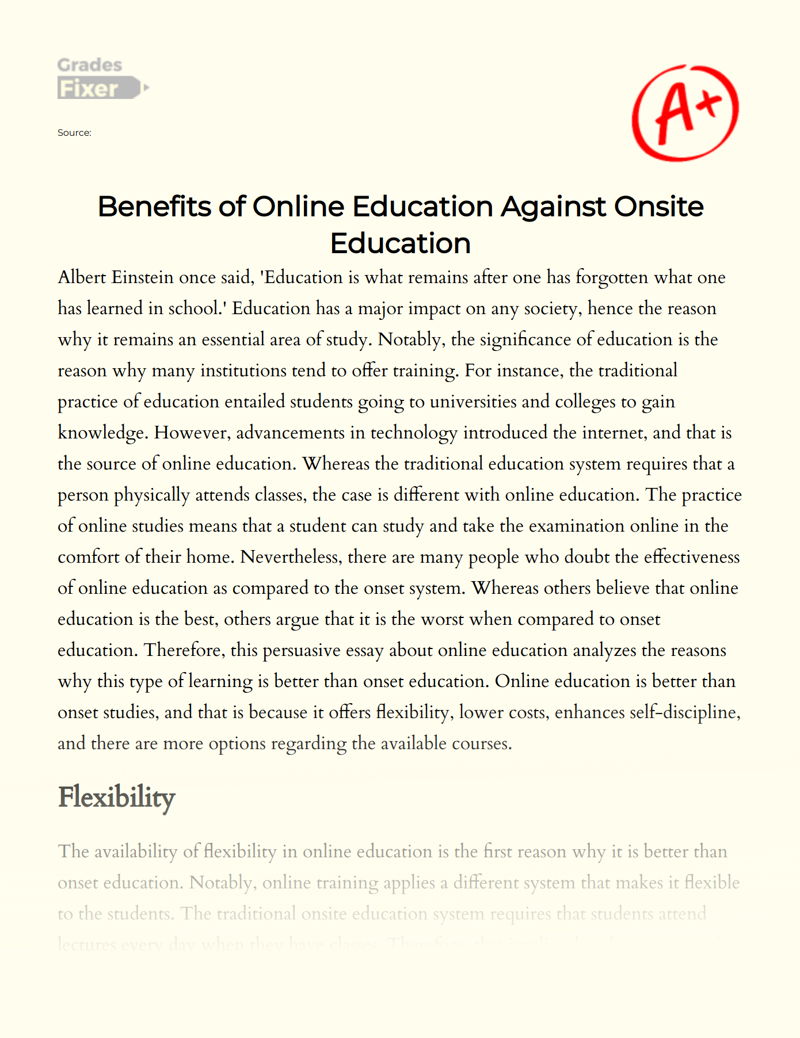
Still can’t find what you need?
Browse our vast selection of original essay samples, each expertly formatted and styled
Related Essays on Online Vs. Traditional Classes
Online education has become an increasingly popular option for students seeking to further their education and obtain a degree. With the advancement of technology, the accessibility and convenience of online education have made [...]
E-Learning Industry. (2021). E-learning Statistics and Facts For 2021. 5(4).
Most of the college using the electronic textbook which purchase from some website or using the PowerPoint nowadays. A traditional textbook is made by hundreds of pages of information, but all of this information is being write [...]
As a college student, the choice between taking courses online or in-person can be a difficult one. While online classes provide flexibility and convenience, they also come with their own set of challenges. In this essay, we [...]
Education on top priority Today, education stands on top of the priority list. Anywhere you go or anything you want to achieve in your life, you require education. The opportunities to get educated and earn degrees are [...]
10 Minute School is the largest online educational platform of Bangladesh. It was introduced or created by Ayman Sadiq with his goal to destroy all kinds of barriers of ensuring quality education to all across Bangladesh. It can [...]
Related Topics
By clicking “Send”, you agree to our Terms of service and Privacy statement . We will occasionally send you account related emails.
Where do you want us to send this sample?
By clicking “Continue”, you agree to our terms of service and privacy policy.
Be careful. This essay is not unique
This essay was donated by a student and is likely to have been used and submitted before
Download this Sample
Free samples may contain mistakes and not unique parts
Sorry, we could not paraphrase this essay. Our professional writers can rewrite it and get you a unique paper.
Please check your inbox.
We can write you a custom essay that will follow your exact instructions and meet the deadlines. Let's fix your grades together!
Get Your Personalized Essay in 3 Hours or Less!
We use cookies to personalyze your web-site experience. By continuing we’ll assume you board with our cookie policy .
- Instructions Followed To The Letter
- Deadlines Met At Every Stage
- Unique And Plagiarism Free
- Contact Your Regional Manager
- News and Blogs
- Staff Portal

Pros and Cons of Online Education
Aug 19, 2015 | White Papers
Pros and Cons of Online Education by Dhirendra Kumar Printable Version (PDF)
North Carolina State University Raleigh, NC [email protected] October 2010
Introduction
The term of online was not very appealing in 1970s and 1080s just like an airplane in the beginning of the 20 th century. Internet was in development stage in early 1990s compared to now and the conventional wisdom about the online courses was different in 1990s than today. We are in the 21 st century where everything is possible and acceptable. For example, students are studying at home/work place utilizing computer which is called online schooling/learning.
There are several factors contributing the growth of online enrollment including the following:
- Younger people are choosing non-traditional education to start and advancing in their careers while completing and furthering their education.
- Severe recession of 2008 has created poor economic situations where people are upgrading/changing their career through online educational/training programs.
Online method of education can be a highly effective alternative method of education for the students who are matured, self-disciplined and motivated, well organized and having high degree of time management skills, but it is an inappropriate learning environment for more dependent learners and has difficulty assuming responsibilities required by the online courses.
The Boston-based consulting firm Eduventures, Inc.(2006) found that about half of institutions and more than 60 percent of employers generally accept the high quality of online learning, but students’ perceptions differ. Only about 33 percent of prospective online students said that they perceive the quality of online education to be “as good as or better than” face-to-face education. At the same time, 36 percent of prospective students surveyed cited concern about employers’ acceptance of online education as a reason for their reluctance to enroll in online courses.
Varieties of online educational methods have been developed, but the potential students should consider some identifiable factors common to all types before enrolling in any course/program. Generally all these factors are not applicable to every online learning situation, but they do apply to most. You as a student should more closely examine the online programs that most interest you and be sure that the program fits your life, career needs and job.
As an educator, your approach to this new paradigm might be with varying degree of enthusiasm and/or concern. Ask yourself a few questions:
- Are you optimistic or skeptical about Online learning?
- Are you interested in knowing how delivering courses online can improve your teaching and offer excellent learning opportunities for your students?
- Do you want to know what you will be up against as you plan and deliver your classes online?
It is critical to consider both the pros and cons of online learning so you can be better prepared to face the challenge of working in this new environment and embrace the new opportunities that it has to offer, and that is its Strengths and Weaknesses. The following is a good listing of these pros and cons of online education:
Online Education Pros: Can be divided into four groups.
- Convenience
- Less Expensive
- Additional Benefits
Convenience: This convenience is in relation to study location, time, course duration, etc.
- No commuting/traveling time to a campus
- No geographic location constraint in selecting the learning option(s)
- No learning pace constraint, you can learn at your pace and study at your convenience
- No verbally expressing constraint, you can express yourself in writing rather than verbally
- You can have virtual discussion rather instructor-led lecture
- Course work and instructions can highly be customized to your field and subject area
- High quality dialog: Learner is able to carefully reflect his/her quality thinking on each comment from others before responding or moving on to the next topic.
- Student centered: Students are expected to read all of their classmates’ contributions, but they may actively engaged only in those parts of the contribution most relevant to their needs.
- Access to resources: It is easy to include guest experts or students from other institutions as well as access to resources and information around the world.
Less Expensive: Generally these courses cost less than regular classroom academic or trade school course.
- No travel and housing costs to classroom
- Class attendee can continue to work at his/her job while taking classes
Technology: You can work on the course just about anywhere you have computer access. Online courses provide an opportunity to learn new technologies and practicing the use of office software, Internet, etc.
Additional Benefits: There are numerous additional benefits.
- You will work with classmates not only from all over the U. S. but could be around the world.
- No discrimination among students due to race, sex, sexual orientation, religion, nationality, age, dress, physical appearance, etc.
- Equal participation from all classmates and the most outgoing student will not monopolize the discussion.
- These courses are better for those people who are introverted as well as who learn through visual cues and require more time in understanding the material.
- No immigration problems
- Synergy: High level of dynamic interaction between the instructor and students as well as among the students themselves. Ideas and resources are shared, and continuous synergy will be generated through the learning process as each individual contributes to the course discussions and comments on classmates’ work.
- Creative teaching: In the adult education class with the interactive learning environment may contribute to self-direction and critical thinking. Especially the nature of the semi-autonomous and self-directed world of the virtual classroom makes innovative and creative approaches to instruction even more important.
Online Education Cons: Can be divided into four groups
- Limited Social Interaction
- Technology Cost and Scheduling
- Effectiveness of Assessments
- Problematic for Instructors
Limited Social Interaction: There is a limited opportunities to interact face-to-face to professors and other students.
- Especially in self-paced courses – difficult to develop relationships with classmates
- Possibility of limited local networking opportunities
- Most of the communication through e-mail, chat room or discussion groups, but no offline get-together
- No personalized attention from instructor with regards to face-to-face interactions and feedbacks
- No campus atmosphere to create social interaction
Technology Cost and Scheduling: Some of the key elements are –
- Computer boot-up time, software programs, and connection to Internet
- Students may be required to learn new or enhanced computer and troubleshooting skills
- Additional cost of high-speed Internet
- Log into your class while at work (unless your employer permits you to complete your course work at the office)
- Plan and adjust your studying schedule around instructor’s assignment due date. For example, east coast versus west coast in the U.S., International course or student, etc.
- If a student is scheduling to study in the night then he/she will have to wait for response from the instructor or classmates by next day
Effectiveness of Assessment: Most educators agree that memory testing is not the best measure of learning in any environment, but classroom tools are difficult to apply. It is difficult to measure program results. Question remains: are students learning what instructor is saying that they should be learning?
Problematic for Instructors: As software is getting more and more advanced, instructors are constantly trying to learn how to keep up.
- Traditional instructors believing in lectures and handouts may have tough time in adopting the system and software.
- Student must be self-motivated and disciplined to progress through his/her program in a timely manner
The facts are that there are advantages and disadvantages to every type of learning environment.
Students have to analyze both the pros and cons factors which contribute greatly to making an informed decision about the direction of his/her career path. Students have to decide, how they are going to accomplish their goals: online, in the classroom or a combination of both.
However, in some situations the inconvenience of maintaining a consistent school schedule prohibits potential students from furthering their education. It is also true that learning is highly dependent on the individual’s motivation to learn. So the bottom line is that the efforts any student puts into their education that eventually determines how much he/she will retain and how beneficial the overall experience was to his/her future career.
View all Online courses
Looking for online courses? Click here to see all IES online course offerings.
Browse Solutions
- All Open Enrollment Courses
- MESH Safety Certificate Program
- OSHA Certificate Program
- Regulatory, Compliance Training and Assessments
- Instructional Design
919.515.2358
[email protected], quick links.
Questions? Email or call 919.515.8584 .
Questions? Email or call 919.515.5358 .
We Can Help
Regional Managers are located across the state to help you with customized onsite training programs!

Piedmont Triad Kami Baggett 919.830.7292
Northeast Lori Benn 919.988.7475
Wake County Robert Crew 919.830.2941
Eastern Alex Easley 910.617.5650
Southwest Jennifer Fielder 704.380.0063
South Central Anna Mangum 919.210.6050
Western Chris McGraw 828.329.3119
Military - Statewide Michael Mullins 919.515.8812
Research Triangle Mitch Poteat 919.607.0684
Central Mary Tillery 910.622.5849
IES Solutions Overview
Want to quickly browse all our solutions? Click here for the complete IES Solutions Overview brochure.

The pros and cons of online learning
What to look for in an online course.
By: MIT xPRO
If you’re at a point in your life where you’re considering continuing your education, you may wonder if online learning is the right path for you.
Taking an online course requires a notable investment of time, effort, and money, so it’s important to feel confident about your decision before moving forward. While online learning works incredibly well for some people, it’s not for everyone.
We recently sat down with MIT xPRO Senior Instructional Designer and Program Manager Luke Hobson to explore the pros and cons of online learning and what to look for in an online course. If you’re waiting for a sign about whether or not to enroll in that course you’ve been eying, you just might find it here.
Pros of Online Learning
First, let’s take a look at the true value of online learning by examining some of the benefits:
1. Flexibility
Online learning’s most significant advantage is its flexibility. It’s the reason millions of adults have chosen to continue their education and pursue certificates and degrees.
Asynchronous courses allow learners to complete work at their own pace, empowering them to find the optimal time to consume the content and submit assignments.
Some people are more attentive, focused, and creative in the mornings compared to the evenings and vice versa. Whatever works best for the learners should be the priority of the learning experience.
2. Community
When Luke asks people about their main reason for enrolling in a course, a common answer is networking and community.
Learners crave finding like-minded individuals who are going through the same experiences and have the same questions. They want to find a place where they belong. Being in the company of others who understand what they’re going through can help online learners who are looking for support and motivation during challenging times and times that are worth celebrating.
Some learners have created study groups and book clubs that have carried on far beyond the end of the course-it’s amazing what can grow from a single post on a discussion board!
3. Latest information
“Speed is a massive benefit of online learning,” and according to Luke, it often doesn’t get the attention it deserves.
“When we say speed, we don’t mean being quick with learning. We mean actual speed to market. There are so many new ideas evolving within technical spaces that it’s impossible to keep courses the way they were originally designed for a long period of time.”
Luke notes that a program on Additive Manufacturing , Virtual Reality and Augmented Reality , or Nanotechnology must be checked and updated frequently. More formal learning modalities have difficulty changing content at this rapid pace. But within the online space, it’s expected that the course content will change as quickly as the world itself does.
Cons of Online Learning
Now that we’ve looked at some of the biggest pros of online learning, let’s examine a few of the drawbacks:
1. Learning environment
While many learners thrive in an asynchronous learning environment, others struggle. Some learners prefer live lessons and an instructor they can connect with multiple times a week. They need these interactions to feel supported and to persist.
Most learners within the online space identify themselves as self-directed learners, meaning they can learn on their own with the right environment, guidance, materials, and assignments. Learners should know themselves first and understand their preferences when it comes to what kind of environment will help them thrive.
2. Repetition
One drawback of online courses is that the structure can be repetitive: do a reading, respond to two discussion posts, submit an essay, repeat. After a while, some learners may feel disengaged from the learning experience.
There are online courses that break the mold and offer multiple kinds of learning activities, assessments, and content to make the learning experience come alive, but it may take some research to find them-more on what to look for in an online course later in this article! Luke and his colleagues at MIT xPRO are mindful of designing courses that genuinely engage learners from beginning to end.

3. Underestimation
Luke has noticed that some learners underestimate how much work is required in an online course. They may mistakenly believe that online learning is somehow “easier” compared to in-person learning.
For those learners who miscalculate how long they will need to spend online or how challenging the assignments can be, changing that mindset is a difficult process. It’s essential to set aside the right amount of time per week to contribute to the content, activities, and assignments. Creating personal deadlines and building a study routine are two best practices that successful online learners follow to hold themselves accountable.
Experience the Value of Online Learning: What to Look For in an Online Course
You’ve probably gathered by now that not all online courses are created equal. On one end of the spectrum, there are methods of online learning that leave learners stunned by what a great experience they had. On the other end of the spectrum, some online learning courses are so disappointing that learners regret their decision to enroll.
If you want to experience the value of online learning, it’s essential to pick the right course. Here’s a quick list of what to look for:
- Feedback and connection to peers within the course platform. Interacting regularly with other learners makes a big difference. Luke and the MIT xPRO team use peer-reviewed feedback to give learners the opportunity to engage with each other’s work.
- Proof of hard work. In the online learning space, proof of hard work often comes in the form of Continuing Education Units (CEUs) or specific certifications. MIT xPRO course participants who successfully complete one or more courses are eligible to receive CEUs , which many employers, licensing agencies, and professional associations accept as evidence of a participant’s serious commitment to their professional development.
Online learning isn’t for everyone, but with the right approach, it can be a valuable experience for many people. Now that you know what to look for in an online course, see what Luke and the MIT xPRO instructional design team have to offer by checking out the latest MIT xPRO courses and programs .
Originally published at http://curve.mit.edu on August 8th, 2022.
The pros and cons of online learning was originally published in MIT Open Learning on Medium, where people are continuing the conversation by highlighting and responding to this story.
Open Learning newsletter

Online Teaching – Teachers rediscover themselves

Kerala puts up a good performance in the overall ranking of educational institutions

IIT – the elusive El Dorado

Student suicide in Kerala: Open book examination eases stress

Unable to attend online class, Dalit schoolgirl in Kerala commits suicide; Institutional negligence say activists
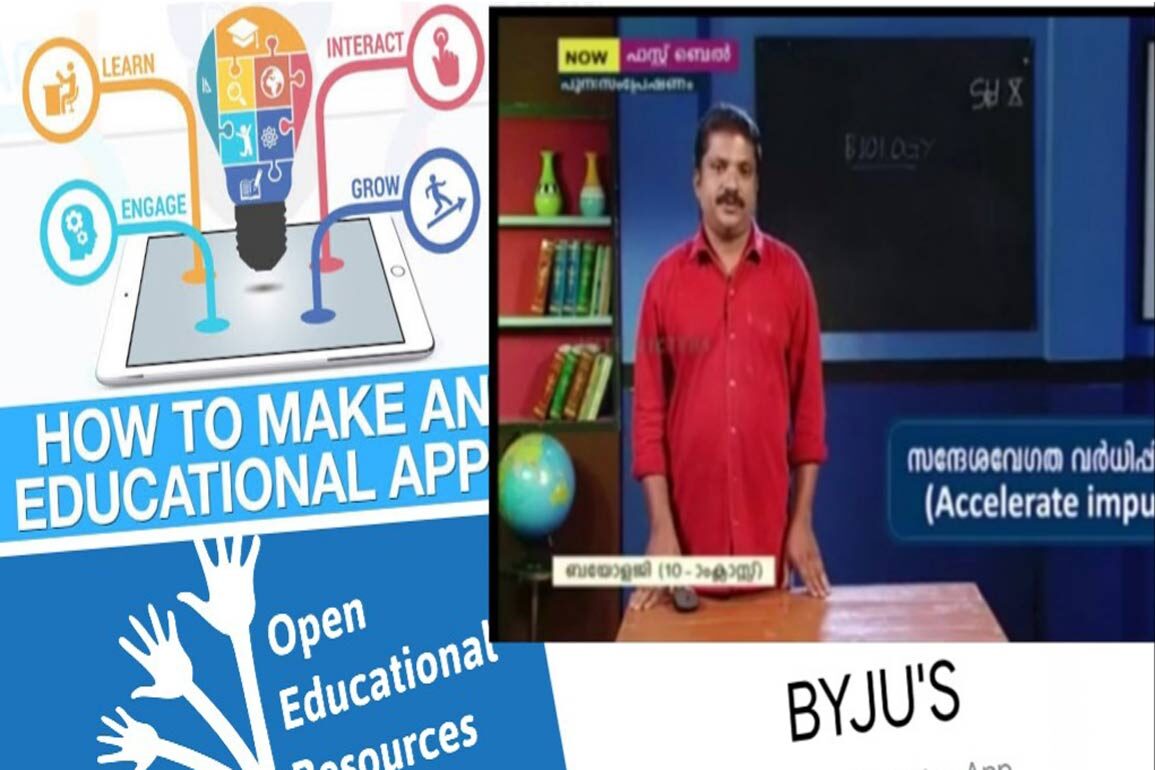
Ten arguments against Online Education
The global Covid pandemic has drastically changed our lives and all of us are now conducting our everyday activities in completely unfamiliar modes. Physical distancing has become a key element in the new protocol. The biggest impact has been in those activities—public or private—which involve a gathering of people. One of the sectors that was tremendously affected is education, with schools and colleges remaining closed indefinitely. The authorities across the country have resorted to online education as a way out. Each State has adopted its own policy on this. While online education is generally regarded as the only solution available at the moment, it comes with its own specific challenges and pitfalls. Here are ten reasons why online education is not that desirable a solution as we are persuaded to believe.
It widens the social divide
Shifting education to the digital platform gives an obvious and undue advantage to the rich and privileged class of society. They have better gadgets, stronger connectivity and greater familiarity with the technology. If education is supposed to be a social leveller, the weaker sections in this case are pushed several yards behind even before the race has begun. Digital divide or technological inequality is a reality, especially between the urban and rural areas. The unfortunate death, by suicide, of a poor schoolgirl on the first day of the new academic year is a grim pointer to this unpleasant truth. While the various government bodies, at least in Kerala, are trying their best to ensure the availability of devices and network, the fact is that there will still be areas which are left out. And the biggest losers will be those who are already disadvantaged—the rural poor, the migrants, the tribals and those who live in remote pockets.
Home isn’t necessarily the same for everyone
By making online education universal and mandatory, the authorities seem to have assumed that all households are alike. They assume that the home is a happy place for all children and that it is easier for them to learn sitting at home. Perhaps it is true for most families. But there are also quite a number of unhappy homes which are simply not conducive for regular learning. There are many young people with no facility whatsoever at their homes and in some cases, the family includes abusive elders. Exposing one’s background is not necessarily a welcome proposition for all. Young minds are quite sensitive to peer assessment. And many of them consider the time spent on the campus as a relief from the unpleasant realities of their personal lives. Online education does not factor these.
It lacks the socialising component
The teaching-learning exercise that takes place in the classroom is only one part of the totality of education. Much of the rest is provided by the social life on the campus. The personal interactions, collaborative engagements, shared experiences, conversations and meals all contribute towards the education of a student. What is the purpose of going to college? It’s not merely for accumulating knowledge, but for preparing the young person to live in a society. The campus is where the young boy or girl comes across and befriends individuals with various social and ideological backgrounds. It is where the young student experiences cultural difference. Online education, on the other hand, pushes him/her to islands of individuality and privacy. There is already the argument that this generation of youngsters has less of real social interaction. By denying them the experiences of a campus life as well, we are making it far worse for them.
Education is not mere data collection
A related argument is that this exercise reduces education to mere data collection. Online education assigns a higher value to quantifiable and downloadable content. Abstract notions, aesthetic values, sentiments and subjective responses of an experiential kind are sidelined. It does not encourage multiplicity of perspectives, subtleties, deliberations or arguments. This is dangerous and reduces education to a mere utilitarian and technical engagement. One is reminded of Charles Dickens’ famous novel Hard Times which opens with the words of Thomas Gradgrind, a School Superintendent: “Now, what I want is Facts. Teach these boys and girls nothing but Facts.” This is a wrong understanding of the purpose of education. It was Albert Einstein who gave what is perhaps the finest definition of education, when he said that it “is what remains in you after you have forgotten all that you have learnt in the classroom.” The present arrangement does not allow anything to remain with the students once their examinations are over. Online education gives no scope for any sentiments or memories to cherish. It’s a mechanical and repetitive exercise that kills the creative and emotional instincts of the young learner.
It seriously affects the nature of teaching and learning
Online education cannot replicate either the quantity or quality of classroom teaching/learning. There is no time for elaboration here. Data is precious, especially for the students, and has to be used diligently. The first casualty will be the interactive element. In most schools and colleges, the teacher lectures on Zoom, Google Meet, or some such platform and the students listen in passively after switching off their cameras and microphones. It is often a technical ritual, without much communication between the teacher and the learner. A text or topic that usually takes several sessions of discussion in a classroom will be dealt with in the online mode using the minimum time. And the whole orientation of teaching and learning is likely to be around the examinations and their grading mechanism.
It makes teachers irrelevant
As a consequence of the last two reasons, the teacher becomes irrelevant in the new scheme of things. A technological takeover is happening in education. We have several knowledge portals, online resources, Apps as well as courses and content offered by well-known institutions. In the information age, the teacher is no longer the only source of knowledge, and rightly so. But the experience and human interaction that a teacher offers is invaluable. But if online education becomes the mainstay, the very profession of teaching as we know it today can be endangered. Big universities and content providers will attract students from all over the world, offer the new kind of education and certify them. The local school and college will turn redundant and this will have serious sociopolitical and cultural implications.
It weakens critical thinking and political practice
One immediate fallout of online education is that it allows no space for critical thinking, let alone political praxis. The vibrant debates, protests and agitations that take place in campuses now and which actually enhance and deepen our democracy, will soon be a thing of the past. With no collectivity or gathering possible, the students will no longer be political subjects but passive consumers of educational content. The JNU of the future will be more like a self-financing private institution, with disciplined boys and girls in uniform. Remember, well-behaved and obedient youngsters may be good news for parents and authorities, but they are usually useless for the nation.
It allows power structures to monitor individuals
Such a scenario is very convenient for the powers that be. Dissent will die a natural death. The student community will be depoliticised. Any aberrations will be dealt with strictly. The State will have a greater role in the formation of the citizens. This is an opportunity that any fascist government will grab immediately.
It furthers the Neo-Capitalist agenda
Capitalism is always on the lookout for new opportunities for making money. It is driven only by self-interest and profit motive. Its ideological engagement with education can be recognized in two ways. a) It looks at Education primarily in terms of employability. It is not interested in the overall development of knowledge and sensibility. Hence it prefers vocational training any day to philosophy, arts or the humanities. b) The second mode of the Capitalist engagement is in the very commodification of education. It treats education as a product that can be marketed and sold. It therefore sees tremendous business opportunity in the sector. While it wasn’t that easy to control the traditional mode of classroom teaching, this recent shift to online education can easily pave the way for what can be described as the LPG (liberalisation, privatisation and globalization) of education.
The contingency plan can become the norm
If the reader thinks that too much of a case is made against what is actually a temporary or contingency plan, well, that’s where the real danger lies.This contingency plan has every chance of becoming the norm. It suits the interests of both the State and Capitalism. And whenever the interest of the government aligns with that of the Corporate world, what we usually get is a deadly combination that is both irresistible and inevitable. Online education is fine as long as it remains a supplementary tool for the classroom engagement on a vibrant campus. In unavoidable circumstances, it can even be a substitute. But we should never allow the substitute to become the substance itself. Online education should never be allowed to replace the real learning process that involves the communion of teachers and fellow students. That social space is precious and needs to be protected at any cost.

Persuasive Essay
Persuasive Essay About Online Education
Last updated on: Jun 19, 2023
Make a Powerful Argument: Tips for Writing a Persuasive Essay About Online Education
By: Nova A.
Reviewed By: Betty P.
Published on: Feb 8, 2023

Are you looking to make a persuasive argument in favor of online education? Are you overwhelmed by the task before you, unsure where to begin? You’re not alone!
Writing an effective persuasive essay requires careful research and planning. But the effort will pay off once you’ve won over your readers and made a persuasive argument.
In this guide, we’ll provide tips for crafting an effective persuasive essay about online education. We’ll also provide persuasive essay examples that effectively outline key points and demonstrate how to make a persuasive argument.
So, let’s look at how to make your argument persuasive.

On this Page
Examples of Persuasive Essays About Online Education
Persuasive essays is a popular form of writing, especially when arguing for or against a particular point of view. In the case of persuasive essays about online education, there are a few key points you'll want to hit to make your argument convincing.
Check out our persuasive essay examples that effectively outline key points and help you craft your essay about online education.
Persuasive essay about online courses
Short Persuasive essay about online education
Impact of online classes on students essay
Online education had a positive impact on the world. It has enabled more people to access higher education, regardless of their physical location or financial situation.
Let's explore the persuasive essay examples that demonstrate this impact.
Persuasive essay about online education during the pandemic
Persuasive essay about online class is better than face to face
Persuasive essay about online education is the new normal
Examples of Persuasive Essay on Pros and Cons of Online Education
When considering persuasive essays on the pros and cons of online education, it's important to consider both sides of the argument.
On the one hand, there are many benefits to embracing the technology-driven approach to learning. On the other, there can be some drawbacks that must be addressed.
In this section, we'll look at persuasive essay examples that explore both sides of this debate.
Benefits of online education essay
Persuasive essay about online education advantages
Persuasive essay about online education disadvantages
Essay on pros and cons of online classes
If you want more examples on how to craft a persuasive essay, check out our persuasive essay examples blog!
Examples of Argumentative Essays About Online Education
When it comes to persuasive, argumentative essays about online education, many key points are the same as persuasive essays.
The main difference is the added layer of logic and reasoning to back up your arguments.

Paper Due? Why Suffer? That's our Job!
Let's explore persuasive essay examples that use a combination of persuasive and argumentative tactics to make a persuasive argument.
Argumentative essay about online education
Argumentative essay about online education relevant to the philippine system
For reference, you can also check out this video!
Tips to Write an Impressive Persuasive Essay
You’re trying to convince your readers of something, and you must ensure that your argument is strong and well-supported. You’re also trying to keep their attention from start to finish.
It can be tricky, but don’t worry! We have some tips for writing an impressive persuasive essay that will leave your audience convinced.
Writing a persuasive essay can be an intimidating task. If you want to learn how to craft a compelling persuasive essay, explore our persuasive essay guide!
Start with a Strong Thesis Statement
Your thesis statement should state the point you are trying to make in your essay and grab the reader’s attention from the get-go.
Put some thought into this! You want your thesis statement to make an impact on your reader. You want to convince them of what you are saying.
Do Your Research
Before you start writing, it is important to do your research to back up all the points you intend to make in your essay.
Make sure that your arguments are supported by reliable sources and evidence; this will add more weight to your words.
A lack of research could weaken or invalidate any claims you make in your essay, so take the time to do it right!
Choose Your Words Carefully
When it comes down to it, how convincing an argument depends on how well it’s written. Choose words that strongly support your augment instead of simply conveying information.
For example, if someone is passionate about a certain cause, use words like “ardent” or “committed” instead of just “interested.” This will help draw readers in and make them more likely to agree with what you have to say!
Reinforce Your Main Points
Throughout your essay, you must reinforce any main points or arguments that you are making. This will help remind readers why they should believe what they are reading and give them more reasons why they should agree with you.
Summarizing key points at the end of each paragraph can serve as helpful reminders for readers as they progress through the essay. It will be easier for them to understand why they should believe what they are reading!
If you want to learn how to make an outline for your persuasive essay, check out our persuasive essay outline blog!
Persuasive Speech Topics About Online Classes
Persuasive speeches are a popular form of writing, especially when arguing for or against a particular point of view.
Check out our persuasive speech topics that will help get you started on crafting your persuasive speech about online education.
- Discuss the benefits of online classes
- What are the pros and cons of online education?
- How to make the most of your online learning experience?
- What are the advantages and disadvantages of taking online classes?
- How do you stay motivated when taking online classes?
- Discuss the role of technology in education.
- What steps can be taken to reduce the cost of tuition for online education programs?
- Discuss potential solutions for improving access to higher education for students from underprivileged backgrounds.
- Discuss the impact of online education on the traditional college system.
- How has online education impacted employment opportunities?
- What is the future of online learning?
Our blog on persuasive essay topics can provide a variety of outstanding topics! Do not forget to check it out!
Now that you have the persuasive essay examples and topics on online education, it's time to start crafting a persuasive essay. Explore both sides of the argument. Consider persuasive speech topics that will help you create an engaging, persuasive speech.
If you struggle with persuasive essays or persuasive speech topics, don't hesitate to reach out to MyPerfectPaper.net. Our " write a paper " service is here to help you craft persuasive essays that will make a powerful argument about online education.
Our persuasive essay writing service can help you create persuasive essays about the pros and cons of online education and more. Moreover, our essay writing service offers benefits like zero plagiarism, 24/7 customer service, and an unlimited number of revisions.
So why wait? Get persuasive writing help from our persuasive essay writer today.
Contact us today, and let's get started!
Frequently Asked Questions
What are some arguments for online learning.
- Online learning is more convenient and flexible than traditional in-person learning.
- Online learning can be more affordable than traditional in-person learning.
- The quality of online learning is often as good or better than traditional in-person learning.
- Online learning can help people learn new skills and knowledge quickly and easily.
- Online learning offers a variety of course options that cater to different interests and needs.
What is the impact of online classes on students?
There are a lot of benefits that students derive from online classes.
- For one, online classes offer more flexibility and convenience than traditional in-person classes.
- Online classes also allow students to learn at their own pace and style, which can be a better fit for some students.
- Additionally, online courses often have fewer expenses than traditional courses, which can be helpful for students on a tight budget.
What is the thesis statement about online learning while writing an argumentative essay?
The thesis statement about online learning can be:
“This form of education is just as effective as traditional classroom instruction.”

Masters Essay, Marketing
Nova Allison is a Digital Content Strategist with over eight years of experience. Nova has also worked as a technical and scientific writer. She is majorly involved in developing and reviewing online content plans that engage and resonate with audiences. Nova has a passion for writing that engages and informs her readers.
Was This Blog Helpful?
Keep reading.
- How to Write a Persuasive Essay - The Basics

- 100+ Persuasive Essay Topics That Will Hook Your Reader's Attention

- Learn From the Best: Check Out Persuasive Essay Examples That Got an A+

- How to Create a Persuasive Essay Outline That Stands Out

- Writing a Persuasive Essay about Gun Control - Best Examples for Students

- Persuasive Essay on Covid-19: Examples to Help You Persuade

- Persuasive Essay About Business: Learn How To Write An Outstanding One

- Achieve Perfection in Your Persuasive Essay About Bullying: Check Out Our Examples!

- Craft an Outstanding Persuasive Essay About Smoking with Our Examples and Tips

- Write an Exceptional Persuasive Essay About Social Media – Look at Our Examples

- Make Your Persuasive Essay About Death Penalty Stand Out: Tips and Examples From Experts

- Craft an Engaging Persuasive Essay About Abortion: Examples, Topics, and Facts
-6026.jpg)
People Also Read
- synthesis essay
- essay topics
- how to write an essay
- autobiography format
Burdened With Assignments?

Advertisement
- LEGAL Privacy Policy
© 2024 - All rights reserved
- Engineering
- Write For Us
- Privacy Policy

Essay on Online Education

Here we have shared the Essay on Online Education in detail so you can use it in your exam or assignment of 150, 250, 400, 500, or 1000 words.
You can use this Essay on Online Education in any assignment or project whether you are in school (class 10th or 12th), college, or preparing for answer writing in competitive exams.
Topics covered in this article.
Essay on Online Education in 150-250 words
Essay on online education in 300-450 words, essay on online education in 500-1000 words.
Online education has emerged as a transformative force in the field of education, especially in recent times. With advancements in technology and internet accessibility, online education offers a flexible and accessible platform for learning. It allows students to access educational resources, participate in virtual classrooms, and interact with teachers and peers from anywhere in the world.
One of the significant advantages of online education is its flexibility. Students can access learning materials and lectures at their convenience, allowing them to balance their studies with other commitments. Online education also provides opportunities for self-paced learning, allowing students to progress at their own speed.
Additionally, online education expands access to quality education, particularly for those in remote areas or with physical limitations. It breaks down geographical barriers, enabling students to learn from renowned institutions and experts worldwide.
Moreover, online education encourages interactive and collaborative learning. Virtual classrooms and discussion forums promote engagement and exchange of ideas, fostering a dynamic learning environment.
However, it is important to acknowledge that online education also poses challenges. Lack of reliable internet connectivity, the need for self-discipline and motivation, and limited opportunities for hands-on learning are some of the potential drawbacks.
In conclusion, online education has revolutionized the education landscape, offering flexibility, accessibility, and collaborative learning opportunities. While it comes with challenges, online education has the potential to transform the way we learn and broaden access to quality education.
Title: Online Education: Revolutionizing the Learning Landscape
Introduction :
Online education has emerged as a transformative force in the field of education. With advancements in technology and internet accessibility, online learning platforms have revolutionized the way people acquire knowledge and skills. This essay discusses the advantages, challenges, and impact of online education on the learning landscape.
Advantages of Online Education
Online education offers numerous advantages. Firstly, it provides flexibility and convenience. Students can access learning materials and participate in virtual classes at their own pace and schedule. This flexibility allows learners to balance their studies with other commitments, such as work or personal responsibilities. Secondly, online education breaks down geographical barriers, enabling students to access quality education regardless of their location. It offers a wide range of courses and programs from reputed institutions and experts worldwide. Lastly, online education fosters interactive and collaborative learning through discussion forums, virtual classrooms, and online group projects, promoting engagement and knowledge exchange.
Challenges of Online Education
Online education also presents certain challenges. Limited access to reliable internet connectivity can hinder the learning experience, particularly in remote areas or developing regions. Additionally, online learning requires self-discipline, time management skills, and intrinsic motivation to stay focused and complete courses. The absence of face-to-face interactions and physical classrooms may reduce the opportunity for hands-on practical experiences, which are essential in certain fields of study. Furthermore, online education may not suit all learning styles, as some students may prefer traditional classroom settings or require personalized attention.
Impact of Online Education
Online education has had a significant impact on the learning landscape. It has expanded access to education, enabling individuals who may have faced barriers, such as geographical limitations or physical disabilities, to pursue their educational goals. Online learning has democratized education, providing opportunities for lifelong learning and professional development. It has also fostered a culture of continuous learning, allowing individuals to acquire new skills and adapt to the changing demands of the job market. Moreover, online education has prompted traditional educational institutions to incorporate technology and online platforms into their teaching methods, enhancing the overall quality of education.
Conclusion:
Online education has revolutionized the way we learn, making education more accessible, flexible, and interactive. Despite challenges, it offers numerous advantages, such as flexibility, global access, and collaborative learning. As technology continues to advance, online education will play an increasingly pivotal role in shaping the future of learning and meeting the diverse educational needs of individuals worldwide.
Title: Online Education – Transforming the Learning Landscape
Online education has emerged as a transformative force in the field of education, revolutionizing the way people learn and acquire knowledge. With advancements in technology and internet connectivity, online learning platforms have gained popularity and have become an integral part of the educational landscape. This essay explores the advantages, challenges, and impact of online education on the learning experience, as well as its potential for the future of education.
Online education offers numerous advantages that contribute to its growing popularity. Firstly, it provides flexibility and convenience. Students can access learning materials and participate in virtual classes at their own pace and schedule. This flexibility allows learners to balance their studies with other commitments, such as work or personal responsibilities. Online education breaks down geographical barriers, enabling students to access quality education regardless of their location. It offers a wide range of courses and programs from reputed institutions and experts worldwide, expanding educational opportunities for students in remote areas or those who are unable to attend traditional classrooms. Secondly, online education promotes self-paced learning. Students can progress through the material at their own speed, reviewing concepts as needed and spending additional time on challenging topics. This individualized approach allows for personalized learning experiences, catering to the unique needs and abilities of each student.
Moreover, online education fosters interactive and collaborative learning. Virtual classrooms, discussion forums, and online group projects provide opportunities for engagement, knowledge exchange, and networking. Students can interact with peers and instructors from diverse backgrounds and cultures, enhancing their global perspective and communication skills.
While online education offers numerous advantages, it also presents certain challenges that need to be addressed. Firstly, access to reliable internet connectivity is crucial for effective online learning. However, in many regions, particularly in developing countries or rural areas, access to high-speed internet may be limited, hindering the learning experience for some students.
Secondly, online learning requires self-discipline, time management skills, and intrinsic motivation. Without the structure of a traditional classroom setting, students must take responsibility for their own learning, set goals, and stay organized to succeed in an online learning environment. The lack of face-to-face interactions and physical presence of instructors and classmates may also reduce social interaction and the sense of community that is often experienced in traditional classrooms.
Additionally, practical subjects that require hands-on experiences, such as laboratory work, performing arts, or certain vocational skills, may be challenging to replicate in an online setting. The absence of physical resources and equipment may limit the practical learning experiences necessary for some fields of study.
Moreover, online education may not suit all learning styles. Some students may thrive in traditional classroom settings with direct instructor guidance, while others may struggle with self-paced learning or the absence of real-time interaction.
Online education has had a significant impact on the learning landscape. It has expanded access to education, enabling individuals who may have faced barriers, such as geographical limitations, financial constraints, or physical disabilities, to pursue their educational goals. Online learning has democratized education, providing opportunities for lifelong learning, professional development, and skills enhancement. Learners from different backgrounds, ages, and locations can access quality education without the need for physical relocation or disruption to their personal and professional lives.
Moreover, online education has prompted traditional educational institutions to incorporate technology and online platforms into their teaching methods. This integration has led to the development of blended learning approaches, combining online and in-person instruction. The use of multimedia resources, interactive tools, and virtual simulations enhances the overall quality of education, making it more engaging and effective.
Online education has also fostered a culture of continuous learning. With rapidly evolving industries and advancements in knowledge, lifelong learning has become essential for personal and professional growth. Online courses, webinars, and educational platforms provide opportunities for individuals to acquire new skills, stay updated with industry trends, and adapt to the changing demands of the job market.
Furthermore, online education has the potential to address the issue of educational equity. It offers a level playing field for students, irrespective of their socioeconomic background or geographical location. Students from disadvantaged communities can access the same quality education as their counterparts from more privileged backgrounds, narrowing the educational gap and promoting social mobility.
Online education also promotes student-centered learning approaches. It empowers learners to take ownership of their education, encouraging critical thinking, problem-solving, and independent learning. The vast resources available online enable students to explore diverse perspectives, conduct research, and engage in self-directed learning experiences.
Conclusion :
Online education has transformed the learning landscape, offering numerous advantages and opportunities for learners around the world. It provides flexibility, accessibility, and personalized learning experiences. However, challenges such as internet connectivity, self-discipline, and limited hands-on experiences need to be addressed to ensure the effectiveness of online education. As technology continues to advance and educational institutions adapt to the changing needs of learners, online education will play an increasingly vital role in the future of education, making learning more accessible, inclusive, and impactful.

Online Education Essay in English (200-250) Words Paragraph & PDF
Online Education Essay in English: Online education is one of the major changes in the global education industry after COVID hits the country. Read Online Education Essay from here only.
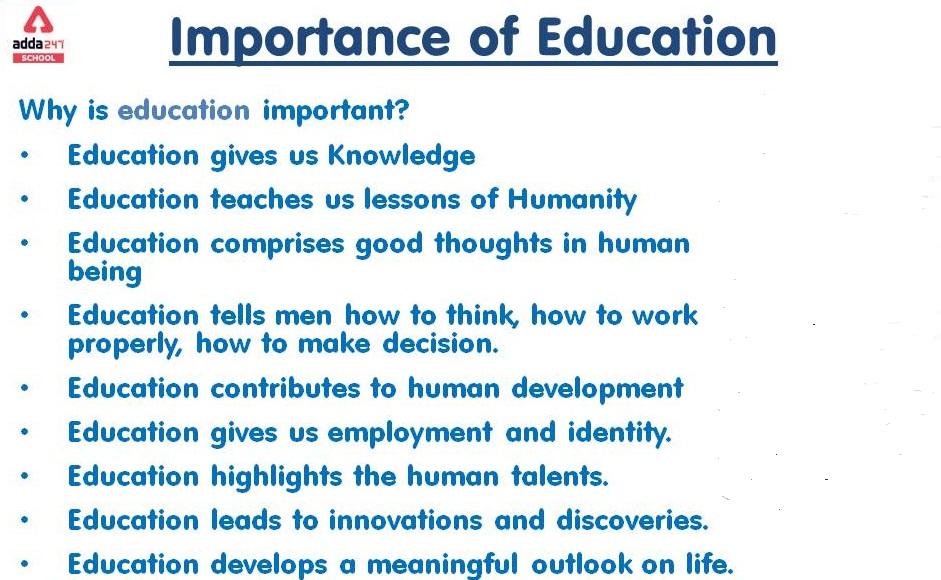
Table of Contents
Online education is a type of learning in which students get instructional content via the internet. It is a flexible and convenient method of learning that has grown in popularity in recent years.
Online Education Essay
Online education is one of the major changes in the global education industry after COVID hits the country. The internet is used for this type of learning. This form of learning has been made easier with new and improved technologies. Higher education institutions favour online learning as well. In short and extended articles about online education, this article will inform students of its benefits and outcomes.
Education spans a range more than just attending classes and reading books to learn things. It exceeds all restrictions. Learning extends beyond the pages of a book. We are fortunate to live in a time where learning is accessible online. Yes! We can educate our kids and ourselves while sitting in our own homes. Online education is a good option for doing this. All needy kids who are unable to enroll in local schools now have access to education thanks to online learning.

Online Education Essay PDF
Download Online Education Essay PDF: Online Education Essay in English

Online Education Essay in English (200-250) words
Today’s Essay on Online Education covers an important subject. There are different types of essays about online education in English for students and children in this post.

Here we, at adda247 are providing 10 lines essays, short essays, and long essays on online education.
- Online education is the process of acquiring education using the internet.
- The Internet is the foundation of online learning.
- Online education was an idea that existed years back.
- It protects students’ sensitive time and money.
- It provides students with a range of courses while sitting at their homes.
- It helped in achieving a balance between safety and education during the pandemic.
- However, it may be shown that it is bad for students’ health.
- In areas with poor network connectivity, studying online is challenging.
- There are numerous online learning resources, including Adda247,Coursera, Udemy etc.
- Online learning features including texts, videos, and animations aid in student comprehension.

Online Education Essay in Paragraph 200-250 Words
These days, technology has impacted every industry, including education. The most recent method of getting an education through the internet is online education. Utilizing your smartphones, laptops, or tablets for learning is a fun and productive method. Both teachers and students can benefit greatly from it, but there are also many drawbacks. Learning from anywhere is flexible with online education.
Non-time-boundness is another advantageous property. You don’t have to sit from morning until lunch like in a typical school. Depending on your preference, you can study online day or night. There is no upper age limit for learning online, in addition to the flexibility of time and location. You can pick the subjects and skills you want to learn by using online education. There are numerous institutions that provide their degrees and courses online. As a result, it is a more practical option to educate yourself without physically visiting schools or universities. Additionally, it helps you save money on transportation and other expenses.
People who reside in areas with poor internet connectivity, however, struggle with online learning. The core of online education is the internet. Your health may suffer if you spend more time in front of devices. Only those with the ability to discipline themselves should consider it.

Online Education Essay in 500-1000 words for UPSC
Introduction: Online education is a flexible method of providing instruction that includes all online learning. Online learning helps students who need to do their work on their own time and at their own speed and gives teachers access to students who may not be able to enroll in a regular classroom course.
The modern method of education, known as online education, differs greatly from the traditional method of learning. For a better comprehension of the students, the instructor or mentor employs a variety of techniques, including texts, audios, films, animations, etc.
Every field is experiencing a rapid increase in the amount of distant learning and the awarding of online degrees. The number of institutions and schools that provide online education is likewise increasing. Students who are seeking degrees online need to be careful in making sure that they finish their coursework through a reputable and recognized university.
Synchronization is a well-known benefit of online learning. Here, the chosen format allows for lively dialogue between the students and the teachers. Sources are exchanged through these communications, and a synergy that is open-ended develops as a result of a learning process. It helps the learner learn more when each person shares their point of view or opinion through conversations and comments on others’ work. This unique advantage can only be achieved through online learning, which creates a virtual learning environment focused on the needs of the students.
We don’t need to commute over long distances or travel to different place because we can take classes online. While pursuing a degree online to advance our careers, we can remain where we are and keep our current jobs. Digital nomads—those who advocate a technologically enabled or location-independent lifestyle—are also helped by online schooling. No matter where we are, we may finish our schoolwork and view lectures.
The online education experience offers a lot more reasonable schedule, whether we are full-time or part-time students. The low cost of online education has contributed to its popularity. Online courses are less expensive than those provided at schools or colleges because of this. While attending a university, we might need to pay for things like transportation, lodging, and meals; however, online education might not.
The inherent flexibility of online learning is one of its key benefits, but there is a catch: one needs to be very self-motivated. The top online learners use a variety of strategies for maintaining their assignments. Setting aside time each week for studying and designing a workspace with few distractions can both be highly beneficial.
Conclusion: Increased educational access, high-quality learning opportunities, improved student outcomes and abilities, and more educational options are some of the possible benefits of online education. Because of online education, variables like location, time, and quality are no longer taken into account when looking for degree programmes or higher education.
Advantages and Disadvantages of Online Education for Essay
Advantages of online education.
Save time and money: Students who pursue their education online do so at a considerable time and financial savings. It cuts down on both the cost and time of transportation. Accessible to All : Everyone has access to online schooling. Online education is available to students of all backgrounds and ages. For students who have physical disabilities, this is one of the main benefits. They can receive an education from the comfort of their own home without having to travel anyplace. No Time Limit : Students have a lot of freedom with online education. Anytime, students can seek knowledge. There is no time limit like there is in the traditional learning method.
Choice : Online education offers a wide range of courses. Students can study skills like personality development and other things that are typically challenging to master offline in addition to course material.
Disadvantages of Online Education
Dependency : Online learning is beneficial for those who can study independently. Kids and other students cannot effectively study online without help. Self-concentration is necessary for this kind of study. Lack of Resources : Online education requires computers or mobile devices as well as strong internet connectivity. Online study is not possible for those without computers or in places with network problems. Disengagement from Society : Spending a lot of time in front of a screen could be bad for your health. The students’ physical growth is also impacted by it. They will grow apart from their friends and society if they don’t attend school.
Online vs Offline Education Comparision
- Time management: Unlike online education, where you can choose a time slot that best suits your needs, offline education has a set timetable.
- Cost-Effectiveness : Online learning is significantly less expensive than traditional learning. Transportation costs are just one of the numerous costs associated with the existing educational system. Students require appropriate uniforms as well as a number of other items.
- Online learning presents new challenges for students, but it also has the potential to cut them off from their surroundings. Children’s physical and mental development are both aided by attending school. They enjoy spending time with their friends and teachers.
- Choice: In an online classroom, students are allowed to select the subject they want to learn about. They can view it multiple times for better comprehension. Students have no options in offline schooling.
- Knowledge Outside the Books: In an offline setting, students physically interact. They also learn other manners, such as self-control, appropriate behaviour, and other related abilities. These competencies are not produced by offline schooling.
Online Education Essay in Hindi
ऑनलाइन शिक्षा पर आज का निबंध एक महत्वपूर्ण विषय को शामिल करता है। इस पोस्ट में छात्रों और बच्चों के लिए अंग्रेजी में ऑनलाइन शिक्षा के बारे में विभिन्न प्रकार के निबंध हैं।
ऑनलाइन शिक्षा पर 10 पंक्तियों के निबंध, लघु निबंध और लंबे निबंध प्रदान कर रहे हैं।
ऑनलाइन शिक्षा इंटरनेट का उपयोग करके शिक्षा प्राप्त करने की प्रक्रिया है। इंटरनेट ऑनलाइन सीखने का आधार है। ऑनलाइन शिक्षा एक ऐसा विचार था जो वर्षों पहले अस्तित्व में था। यह छात्रों के संवेदनशील समय और धन की रक्षा करता है। यह छात्रों को उनके घरों पर बैठकर कई तरह के पाठ्यक्रम प्रदान करता है। इसने महामारी के दौरान सुरक्षा और शिक्षा के बीच संतुलन हासिल करने में मदद की। हालांकि, यह दिखाया जा सकता है कि यह छात्रों के स्वास्थ्य के लिए खराब है। खराब नेटवर्क कनेक्टिविटी वाले क्षेत्रों में, ऑनलाइन अध्ययन करना चुनौतीपूर्ण है। Adda247, Coursera, Udemy आदि सहित कई ऑनलाइन शिक्षण संसाधन हैं। टेक्स्ट, वीडियो और एनिमेशन सहित ऑनलाइन सीखने की विशेषताएं छात्र की समझ में सहायता करती हैं। 250-300 शब्दों में ऑनलाइन शिक्षा निबंध
इन दिनों, प्रौद्योगिकी ने शिक्षा सहित हर उद्योग को प्रभावित किया है। इंटरनेट के माध्यम से शिक्षा प्राप्त करने का सबसे हालिया तरीका ऑनलाइन शिक्षा है। सीखने के लिए अपने स्मार्टफोन, लैपटॉप या टैबलेट का उपयोग करना एक मजेदार और उत्पादक तरीका है। इससे शिक्षक और छात्र दोनों ही काफी लाभान्वित हो सकते हैं, लेकिन कई कमियां भी हैं। ऑनलाइन शिक्षा के साथ कहीं से भी सीखना लचीला है।
गैर-समयबद्धता एक और लाभप्रद संपत्ति है। आपको एक ठेठ स्कूल की तरह सुबह से दोपहर के भोजन तक बैठने की ज़रूरत नहीं है। आप अपनी पसंद के आधार पर दिन हो या रात ऑनलाइन पढ़ाई कर सकते हैं। समय और स्थान के लचीलेपन के अलावा, ऑनलाइन सीखने के लिए कोई ऊपरी आयु सीमा नहीं है। आप ऑनलाइन शिक्षा का उपयोग करके उन विषयों और कौशलों को चुन सकते हैं जिन्हें आप सीखना चाहते हैं। ऐसे कई संस्थान हैं जो अपनी डिग्री और पाठ्यक्रम ऑनलाइन प्रदान करते हैं। नतीजतन, शारीरिक रूप से स्कूलों या विश्वविद्यालयों का दौरा किए बिना खुद को शिक्षित करना एक अधिक व्यावहारिक विकल्प है। इसके अतिरिक्त, यह आपको परिवहन और अन्य खर्चों पर पैसे बचाने में मदद करता है।
हालांकि, जो लोग खराब इंटरनेट कनेक्टिविटी वाले क्षेत्रों में रहते हैं, उन्हें ऑनलाइन सीखने में कठिनाई होती है। ऑनलाइन शिक्षा का मूल इंटरनेट है। यदि आप उपकरणों के सामने अधिक समय बिताते हैं तो आपका स्वास्थ्य खराब हो सकता है। केवल उन्हें ही इस पर विचार करना चाहिए जो स्वयं को अनुशासित करने की क्षमता रखते हैं।
यूपीएससी के लिए 500-1000 शब्दों में ऑनलाइन शिक्षा निबंध
परिचय: ऑनलाइन शिक्षा निर्देश प्रदान करने का एक लचीला तरीका है जिसमें सभी ऑनलाइन शिक्षण शामिल हैं। ऑनलाइन सीखने से उन छात्रों को मदद मिलती है जिन्हें अपना काम अपने समय पर और अपनी गति से करने की आवश्यकता होती है और शिक्षकों को उन छात्रों तक पहुंच प्रदान करता है जो नियमित कक्षा पाठ्यक्रम में नामांकन करने में सक्षम नहीं हो सकते हैं।
शिक्षा की आधुनिक पद्धति, जिसे ऑनलाइन शिक्षा के रूप में जाना जाता है, सीखने की पारंपरिक पद्धति से बहुत अलग है। छात्रों की बेहतर समझ के लिए, प्रशिक्षक या संरक्षक कई तरह की तकनीकों का इस्तेमाल करते हैं, जिनमें टेक्स्ट, ऑडियो, फिल्म, एनिमेशन आदि शामिल हैं।
हर क्षेत्र दूरस्थ शिक्षा और ऑनलाइन डिग्री प्रदान करने की मात्रा में तेजी से वृद्धि का अनुभव कर रहा है। ऑनलाइन शिक्षा प्रदान करने वाले संस्थानों और स्कूलों की संख्या भी बढ़ रही है। ऑनलाइन डिग्री चाहने वाले छात्रों को यह सुनिश्चित करने में सावधानी बरतने की जरूरत है कि वे एक प्रतिष्ठित और मान्यता प्राप्त विश्वविद्यालय के माध्यम से अपना शोध कार्य पूरा करें।
तुल्यकालन ऑनलाइन सीखने का एक प्रसिद्ध लाभ है। यहां, चुना गया प्रारूप छात्रों और शिक्षकों के बीच जीवंत संवाद की अनुमति देता है। इन संचारों के माध्यम से स्रोतों का आदान-प्रदान किया जाता है, और एक सीखने की प्रक्रिया के परिणामस्वरूप एक तालमेल विकसित होता है। यह शिक्षार्थी को अधिक जानने में मदद करता है जब प्रत्येक व्यक्ति बातचीत और दूसरों के काम पर टिप्पणियों के माध्यम से अपनी बात या राय साझा करता है। यह अनूठा लाभ केवल ऑनलाइन सीखने के माध्यम से प्राप्त किया जा सकता है, जो छात्रों की जरूरतों पर केंद्रित एक आभासी सीखने का माहौल बनाता है।
हमें लंबी दूरी तय करने या अलग-अलग जगहों की यात्रा करने की आवश्यकता नहीं है क्योंकि हम ऑनलाइन कक्षाएं ले सकते हैं। अपने करियर को आगे बढ़ाने के लिए ऑनलाइन डिग्री का पीछा करते हुए, हम जहां हैं वहीं रह सकते हैं और अपनी वर्तमान नौकरी रख सकते हैं। डिजिटल खानाबदोश – जो तकनीकी रूप से सक्षम या स्थान-स्वतंत्र जीवन शैली की वकालत करते हैं – को भी ऑनलाइन स्कूली शिक्षा से मदद मिलती है। चाहे हम कहीं भी हों, हम अपना स्कूल का काम पूरा कर सकते हैं और व्याख्यान देख सकते हैं।
ऑनलाइन शिक्षा का अनुभव बहुत अधिक उचित कार्यक्रम प्रदान करता है, चाहे हम पूर्णकालिक या अंशकालिक छात्र हों। ऑनलाइन शिक्षा की कम लागत ने इसकी लोकप्रियता में योगदान दिया है। इस वजह से स्कूलों या कॉलेजों में प्रदान किए जाने वाले ऑनलाइन पाठ्यक्रमों की तुलना में ऑनलाइन पाठ्यक्रम कम खर्चीले हैं। विश्वविद्यालय में भाग लेने के दौरान, हमें परिवहन, आवास और भोजन जैसी चीज़ों के लिए भुगतान करना पड़ सकता है; हालाँकि, ऑनलाइन शिक्षा नहीं हो सकती है।
ऑनलाइन सीखने का अंतर्निहित लचीलापन इसके प्रमुख लाभों में से एक है, लेकिन एक पकड़ है: किसी को बहुत आत्म-प्रेरित होने की आवश्यकता है। शीर्ष ऑनलाइन शिक्षार्थी विभिन्न प्रकार की रणनीतियों का उपयोग करते हैं
अपने कार्यों को बनाए रखने के लिए। अध्ययन के लिए हर हफ्ते समय अलग करना और कुछ ध्यान भटकाने वाले कार्यक्षेत्र को डिजाइन करना दोनों ही अत्यधिक फायदेमंद हो सकते हैं।
निष्कर्ष: बढ़ी हुई शैक्षिक पहुंच, उच्च गुणवत्ता वाले सीखने के अवसर, बेहतर छात्र परिणाम और क्षमताएं, और अधिक शैक्षिक विकल्प ऑनलाइन शिक्षा के कुछ संभावित लाभ हैं। ऑनलाइन शिक्षा के कारण, डिग्री प्रोग्राम या उच्च शिक्षा की तलाश में स्थान, समय और गुणवत्ता जैसे चरों को ध्यान में नहीं रखा जाता है।
Found this article helpful?
Let’s connect via chat or call our senior expert counselor at +91-9625869989 to learn more about the different streams and options available. We would love it if we could add some of your insights. If you have a definite goal of scoring the highest marks, then you can resolve your doubts via our app/quizzes and youtube class assistance ( https://www.youtube.com/c/Adda247School )
Related Post:
- Cow Essay- 10 Lines In English/Hindi For Class 1 & 3
- Teachers Day
- What Is National Income
Essay on Online Education- FAQs
Q.Are online learning and distance learning the same?
Ans. Online learning follows a school learning format and provides students more campus-like feel. Students have a formal or informal interactions with the teachers as well as their peers. But in distance learning, there is no interaction with teachers or classmates.
Q. What are some benefits of online classes?
- Flexibility.
- Reduced Costs.
- More Free Time.
- Increased Course Variety.
- Career Advancement Opportunities.
Q. How does online education affect students?
Ans.Online learning has helped students to become independent learners before they make their way into the real world.
Q. Are online classes good for students?
Ans. The importance of online classes are that they are much more convenient and flexible as compared to traditional learning platforms.
Q. Why do students prefer online learning?
Ans. Online courses are easily accessible on much smaller budgets . In addition to the convenience and the cost, a large number of students are turning to online learning courses because they have become a better way to learn.
Sharing is caring!
Are online learning and distance learning the same?
Online learning follows a school learning format and provides students more campus-like feel. Students have a formal or informal interactions with the teachers as well as their peers. But in distance learning, there is no interaction with teachers or classmates.

Leave a comment
Your email address will not be published. Required fields are marked *
Save my name, email, and website in this browser for the next time I comment.
Trending Articles
- 2nd PUC Result 2024 Link
- NEET Syllabus 2024 [Reduced]

CBSE Board Exam 2024
- CBSE Class 10 Syllabus 2024
- CBSE Class 12 Syllabus 2024
- CBSE Previous Year Papers
- CUET Syllabus
- CUET Previous Year paper
- CUET Participating College & Universities
- JEE Main 2024
- JEE Main Syllabus 2024
- JEE Main Exam Analysis 2023
- NEET 2024
- NEET Syllabus 2024
- NEET State wise Cut off
- NEET Rank Predictor
- NEET OMR Sheet
- NEET College Predictor
Recent Posts
Important exams, ncert solutions.
- NCERT Class 12
- NCERT Class 11
- NCERT Class 10
- NCERT Class 9
NCERT Books
School syllabus.
- CBSE Class 12
- CBSE Class 11
- CBSE Class 10
- CBSE Class 9
- JEE Mains 2024
Our Other Websites
- Teachers Adda
- Bankers Adda
- Adda Malayalam
- Adda School
- Adda Punjab
- Current Affairs
- Defence Adda
- Adda Bengali
- Engineers Adda
- Adda Marathi

Get all your queries solved in one single place. We at Adda247 school strive each day to provide you the best material across the online education industry. We consider your struggle as our motivation to work each day.
Download Adda247 App
Follow us on
- Responsible Disclosure Program
- Cancellation & Refunds
- Terms & Conditions
- Privacy Policy
- News & Insights
- All News & Insights
Does bias exist in online learning?
New study explores whether race and gender of students in virtual spaces impact teacher grading and their recommendations for educational programs.

As remote learning becomes commonplace amid the COVID-19 pandemic, little research has explored teacher bias in these virtual spaces. But a published study led by USC Rossier Associate Professor Yasemin Copur-Gencturk now suggests educators’ unconscious judgments in an online environment can deepen inequities.
The report, “ Teacher bias in the virtual classroom ,” is co-authored by Ian Thacker PhD ’20 from the University of Texas at San Antonio and Joseph R. Cimpian from New York University. “Our study shows that when there is limited information, existing implicit biases in society have an influence on teachers’ judgments,” said Copur-Gencturk.
“In sum, when presented with ambiguous evidence of student learning, K-12 teachers in virtual classrooms seem to rely on stereotypes when recommending students for advanced learning or for special education services,” the authors wrote.
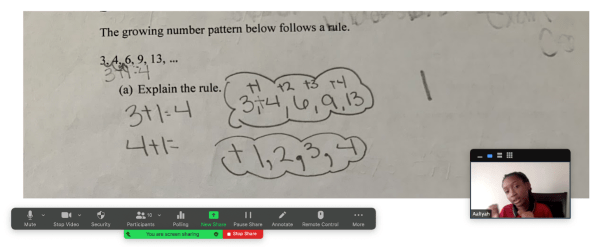
Copur-Gencturk and her colleagues explored this question by conducting an experiment with more than 1,000 teachers across the United States. It asked teachers to evaluate each student’s mathematical ability and recommend that the student be evaluated for gifted or individualized learning programs. While evaluating each student's work, teachers were shown an image of the student's work accompanied by a randomly assigned image of a student.
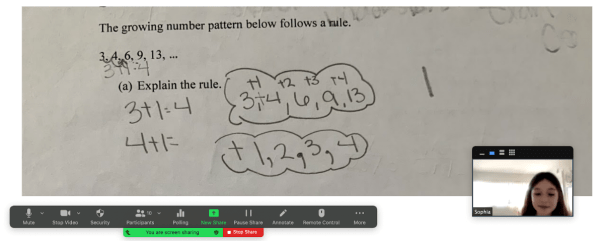
The study showed that teachers did not grade identical student work differently when shown the image of Black student or one of a White student. However, teachers recommended boys more often than girls to be tested for gifted education, and they recommended Black students for evaluation into special education programs more often than they did for White students.
The researchers also found that the racial profiles of the schools where teachers were working had an impact on their student recommendations for gifted or individualized learning programs. Teachers were asked based on their expertise would they recommend a student for the Gifted and Talented program or a special Individualized Education Program. Black students were recommended for special education programs at a higher rate in schools with higher concentrations of Black students. Gender differences were more pronounced for gifted-education recommendations in schools with lower concentrations of Black students.
“Our findings echo the importance of reducing the ambiguity that clouds teachers’ judgment and, in turn, leads them to rely on cultural gender and racial biases. Teachers’ ambitious daily schedule for meeting the demands of the teaching profession leaves little to no time for them to get to know their students,” said Copur-Gencturk. “Allocating time in the school schedule for teachers to check in with their students and get to know them should be a routine practice, particularly in online learning settings.”
“ Teacher bias in the virtual classroom ” is available online and appears in the December 2022 issue of the journal Computers & Education .

Yasemin Copur-Gencturk
- Associate Professor of Education
Article Type
Article topics.
- Diversity, equity and inclusion
Related News & Insights
April 9, 2024

‘It is open season on DEI’
Scholars discuss the current environment in higher education and offer historical context and policy insights at the 45th Pullias Lecture.
Featured Faculty
- Adrianna Kezar
- Royel M. Johnson, PhD
- Pedro Noguera
April 4, 2024

Annual conference challenges presenters to dismantle racial injustice and construct educational possibilities
The 2024 American Educational Research Association Conference to feature over five-dozen USC Rossier scholars.
March 28, 2024

Center for Education, Identity and Social Justice hosts USC Hybrid High students for visit and releases report on study of the school
The final report finds students’ sense of belonging to their high school and college declines after graduation and provides recommendations to improve student support.
- Shafiqa Ahmadi
- Darnell Cole
- Share full article
Advertisement
Supported by
Guest Essay
Is This the End of Academic Freedom?

By Paula Chakravartty and Vasuki Nesiah
Dr. Chakravartty is a professor of media, communication and culture at New York University, where Dr. Nesiah is a professor of practice in human rights and international law.
At New York University, the spring semester began with a poetry reading. Students and faculty gathered in the atrium of Bobst Library. At that time, about 26,000 Palestinians had already been killed in Israel’s horrific war on Gaza; the reading was a collective act of bearing witness.
The last poem read aloud was titled “If I Must Die.” It was written, hauntingly, by a Palestinian poet and academic named Refaat Alareer who was killed weeks earlier by an Israeli airstrike. The poem ends: “If I must die, let it bring hope — let it be a tale.”
Soon after those lines were recited, the university administration shut the reading down . Afterward, we learned that students and faculty members were called into disciplinary meetings for participating in this apparently “disruptive” act; written warnings were issued.
We have both taught at N.Y.U. for over a decade and believe we are in a moment of unparalleled repression. Over the past six months, since the start of Israel’s war on Gaza, we have seen the university administration fail to adequately protect dissent on campus, actively squelching it instead. We believe what we are witnessing in response to student, staff and faculty opposition to the war violates the very foundations of academic freedom.
While N.Y.U. says that it remains committed to free expression on campus and that its rules about and approach to protest activity haven’t changed, students and faculty members in solidarity with the Palestinian people have found the campus environment alarmingly constrained.
About a week after Hamas’s attacks in October, the Grand Staircase in the Kimmel student center, a storied site of student protests , closed indefinitely; it has yet to reopen fully. A graduate student employee was reprimanded for putting up fliers in support of Palestinians on the student’s office door and ultimately took them down; that person is not the only N.Y.U. student to face some form of disciplinary consequence for pro-Palestinian speech or action. A resolution calling for the university to reaffirm protection of pro-Palestinian speech and civic activity on campus, passed by the elected Student Government Assembly in December, has apparently been stuck in a procedural black hole since.
The New York Police Department has become a pervasive presence on campus, with over 6,000 hours of officer presence added after the war broke out. Hundreds of faculty members have signed onto an open letter condemning the university’s “culture of fear about campus speech and activism.”
Such draconian interventions are direct threats to academic freedom.
At universities across the country, any criticism of Israel’s policies, expressions of solidarity with Palestinians, organized calls for a cease-fire or even pedagogy on the recent history of the land have all emerged as perilous speech. In a letter to university presidents in November, the A.C.L.U. expressed concern about “impermissible chilling of free speech and association on campus” in relation to pro-Palestinian student groups and views; since then, the atmosphere at colleges has become downright McCarthyite .
The donors, trustees, administrators and third parties who oppose pro-Palestinian speech seem to equate any criticism of the State of Israel — an occupying power under international law and one accused of committing war crimes — with antisemitism. To them, the norms of free speech are inherently problematic, and a broad definition of antisemitism is a tool for censorship . Outside funding has poured into horrifying doxxing and harassment campaigns. Pro-Israel surveillance groups like Canary Mission and CAMERA relentlessly target individuals and groups deemed antisemitic or critical of Israel. Ominous threats follow faculty and students for just expressing their opinions or living out their values.
To be clear, we abhor all expressions of antisemitism and wholeheartedly reject any role for antisemitism on our campuses. Equally, we believe that conflating criticism of Israel or Zionism with antisemitism is dangerous. Equating the criticism of any nation with inherent racism endangers basic democratic freedoms on and off campus. As the A.C.L.U. wrote in its November statement, a university “cannot fulfill its mission as a forum for vigorous debate” if it polices the views of faculty members and students, however much any of us may disagree with them or find them offensive.
In a wave of crackdowns on pro-Palestinian speech nationwide, students have had scholarships revoked, job offers pulled and student groups suspended. At Columbia, protesters have reported being sprayed by what they said was skunk, a chemical weapon used by the Israeli military; at Northwestern, two Black students faced criminal charges , later dropped, for publishing a pro-Palestinian newspaper parody; at Cornell, students were arrested during a peaceful protest . In a shocking episode of violence last fall, three Palestinian students , two of them wearing kaffiyehs, were shot while walking near the University of Vermont.
Many more cases of student repression on campuses are unfolding.
Academic freedom, as defined by the American Association of University Professors in the mid-20th century , provides protection for the pursuit of knowledge by faculty members, whose job is to educate, learn and research both inside and outside the academy. Not only does this resonate with the Constitution’s free speech protections ; international human rights law also affirms the centrality of academic freedom to the right to education and the institutional autonomy of educational institutions.
Across the United States, attacks on free speech are on the rise . In recent years, right-wing groups opposed to the teaching of critical race theory have tried to undermine these principles through measures including restrictions on the discussion of history and structural racism in curriculums, heightened scrutiny of lectures and courses that are seen to promote dissent and disciplinary procedures against academics who work on these topics.
What people may not realize is that speech critical of Israel’s occupation and apartheid policies has long been censored, posing persistent challenges to those of us who uphold academic freedom. Well before Oct. 7, speech and action at N.Y.U. in support of Palestinians faced intense and undue scrutiny.
Our students are heeding Refaat Alareer’s call to bear witness. They are speaking out — writing statements, organizing protests and responding to a plausible threat of genocide with idealism and conviction. As faculty members, we believe that college should be a time when students are encouraged to ask big questions about justice and the future of humanity and to pursue answers however disquieting to the powerful.
Universities must be places where students have access to specialized knowledge that shapes contemporary debates, where faculty members are encouraged to be public intellectuals, even when, or perhaps especially when, they are expressing dissenting opinions speaking truth to power. Classrooms must allow for contextual learning, where rapidly mutating current events are put into a longer historical timeline.
This is a high-stakes moment. A century ago, attacks on open discussion of European antisemitism, the criminalization of dissent and the denial of Jewish histories of oppression and dispossession helped create the conditions for the Holocaust. One crucial “never again” lesson from that period is that the thought police can be dangerous. They can render vulnerable communities targets of oppression. They can convince the world that some lives are not as valuable as others, justifying mass slaughter.
It is no wonder that students across the country are protesting an unpopular and brutal war that, besides Israel, only the United States is capable of stopping. It is extraordinary that the very institutions that ought to safeguard their exercise of free speech are instead escalating surveillance and policing, working on ever more restrictive student conduct rules and essentially risking the death of academic freedom.
From the Vietnam War to apartheid South Africa, universities have been important places for open discussion and disagreement about government policies, the historical record, structural racism and settler colonialism. They have also long served as sites of protest. If the university cannot serve as an arena for such freedoms, the possibilities of democratic life inside and outside the university gates are not only impoverished but under threat of extinction.
Paula Chakravartty is a professor of media, communication and culture at New York University, where Vasuki Nesiah is a professor of practice in human rights and international law. Both are members of the executive committee of the N.Y.U. chapter of the American Association of University Professors and members of N.Y.U.’s Faculty for Justice in Palestine.
The Times is committed to publishing a diversity of letters to the editor. We’d like to hear what you think about this or any of our articles. Here are some tips . And here’s our email: [email protected] .
Follow the New York Times Opinion section on Facebook , Instagram , TikTok , WhatsApp , X and Threads .

IMAGES
VIDEO
COMMENTS
This essay argues the contemporary benefits of online learning, and that these benefits significantly outweigh the issues, challenges and disadvantages of online learning. Online learning is giving people new choices and newfound flexibility with their personal learning and development. Whereas before, formal academic qualifications could only ...
With the help of online education, they can plan their study themselves, taking into consideration their working schedule, family needs, and amount of spare time. As for the second argument of this side, it is also good because people study themselves depending only upon their wish, and no teacher can make them study (Deane, 2005, pp. 34 - 54).
Short Argumentative Essay Against Online Education (Sample) Disadvantages of Online Education: Online or internet-based learning is a relatively new mode of education. While face-to-face education has been around for centuries, online education is still developing every day. I believe that traditional schooling is much better than online education.
217. A UNESCO report says schools' heavy focus on remote online learning during the pandemic worsened educational disparities among students worldwide. Amira Karaoud/Reuters. By Natalie Proulx ...
Essay on Online Education in 100 words. Online education is a modern educational paradigm where students access instructional content through the internet. This innovative approach has gained immense popularity, especially after the pandemic, owing to its convenience and adaptability. It has enabled students of all ages to acquire knowledge ...
A few weeks ago our president, Teresa A. Sullivan, was summarily dismissed and then summarily reinstated by the university's board of visitors. One reason for her dismissal was the perception ...
Online education is a part of our modern, media-entangled ecosystem -- I get it. ... I've read the books that rail against the internet and its stupefying effects. They echo jeremiads written against newfangled print culture when it was sweeping across 15th-century Europe. Maybe smartphones are bad for us in the same way Socrates thought ...
This allows students to access the learning material at a time of their comfort. Thus, online learning offers students the accessibility of time and place in education. 3. Affordability. Another advantage of online learning is reduced financial costs. Online education is far more affordable as compared to physical learning.
Make a claim. Provide the grounds (evidence) for the claim. Explain the warrant (how the grounds support the claim) Discuss possible rebuttals to the claim, identifying the limits of the argument and showing that you have considered alternative perspectives. The Toulmin model is a common approach in academic essays.
This essay has provided persuasive arguments in support of online education, which are flexibility, lower costs, enhances self-discipline, and there are more options regarding the available courses. The paper has provided a detailed analysis to prove that online education is the best.
The term of online was not very appealing in 1970s and 1080s just like an airplane in the beginning of the 20th century. Internet was in development stage in early 1990s compared to now and the conventional wisdom about the online courses was different in 1990s than today. We are in the 21st century where everything is possible and acceptable. For example, students are studying at home/work ...
First, let's take a look at the true value of online learning by examining some of the benefits: 1. Flexibility. Online learning's most significant advantage is its flexibility. It's the reason millions of adults have chosen to continue their education and pursue certificates and degrees. Asynchronous courses allow learners to complete ...
It seriously affects the nature of teaching and learning. Online education cannot replicate either the quantity or quality of classroom teaching/learning. There is no time for elaboration here. Data is precious, especially for the students, and has to be used diligently. The first casualty will be the interactive element.
Persuasive essays is a popular form of writing, especially when arguing for or against a particular point of view. In the case of persuasive essays about online education, there are a few key points you'll want to hit to make your argument convincing. Check out our persuasive essay examples that effectively outline key points and help you craft ...
Online Education Essay. Online Courses ; Online education, often referred to as e-learning, web-based learning, virtual learning or online learning has been around for over a decade. Since the covid-19 pandemic hit a couple of years ago, there has been a rapid increase in the use and acceptance of online education.
Essay on Online Education. You can use this Essay on Online Education in any assignment or project whether you are in school (class 10th or 12th), college, or preparing for answer writing in competitive exams. Topics covered in this article. Essay on Online Education in 150-250 words. Essay on Online Education in 300-450 words.
Download Online Education Essay PDF: Online Education Essay in English. Online Education Essay in English (200-250) words. Today's Essay on Online Education covers an important subject. There are different types of essays about online education in English for students and children in this post. Here we, at adda247 are providing 10 lines ...
But a published study led by USC Rossier Associate Professor Yasemin Copur-Gencturk now suggests educators' unconscious judgments in an online environment can deepen inequities. The report, " Teacher bias in the virtual classroom ," is co-authored by Ian Thacker PhD '20 from the University of Texas at San Antonio and Joseph R. Cimpian ...
Online education has emerged as a dynamic and versatile alternative, providing learners with unprecedented access to a wealth of resources and opportunities. Let's explore here, Online Education Essay. Online education, also known as e-learning or distance learning, is an innovative approach to acquiring knowledge and skills using digital ...
Online Education I do not agree with the choice made by students to go to high school via the internet. An online setting cannot provide the same experience an actual classroom can. A public school and a classroom can offer so much more, not only academically, socially too. Many people unde...
Essay on Online Education: Online learning is one of the imminent trends in the education sector around the globe. This mode of learning is done through the internet. With advanced and upgraded technologies, this mode of learning has been made simpler. Online Education is also preferred in higher learning Institutions. This article will render the […]
Online education is an effective and comparable alternative to a traditional classroom setting, and it can be a great opportunity for a non-traditional student to further his or her education and become one step closer to being a successful, self-sufficient individual.…. 1769 Words. 8 Pages. Better Essays.
Write an essay on online vs offline education in 500 words: Just 2 years back, the idea of online education was almost incomprehensible to common minds. But now Online classes and the concept of Online Education have taken an important part in a lot of areas. Ever since the pandemic in 2020, the governments forced people to stay in their homes ...
It was written, hauntingly, by a Palestinian poet and academic named Refaat Alareer who was killed weeks earlier by an Israeli airstrike. The poem ends: "If I must die, let it bring hope — let ...